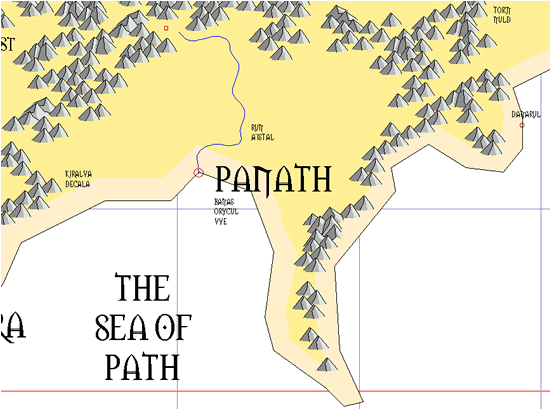|
The World of Teréth End - Gazetteer - Terèthor - Dekàlas |
|||||||||||||||||||||||||||||||
|
Links Home "...[name] stood in the [name2] Hall, a hundred peers watching from the galleys above. She called her Provider's name, and all could feel the power she commanded. [name3] summoned his wards, but all that watched knew his efforts were in vain. The next name she offered was his, and the misery of [name3] was legend." translated from Dekàlan fragment found in ruins of Ilduùn |
Panath Capital: City of Panath Tropical Nor Kalas Panath lies between a saddle of high mountains and the Sea of Path, in central Terèthor. The region is known for its low and dense mist-clouded jungles. The city-state is renown for the the nine great Halls of the Temple of Path where the Keepers of the Flames tirelessly study the ancient lores. The first land to be conquered and grafted to the fledgling Old Empire of Dekàlas, Panath is central to the cultural and historical identity of the Empire.
Landmarks The Clock of Kort Orgèrün was built in 936 HK by the famed Rothic clockmaker Gurl Marjord. Considered by many to be Marjord's masterpiece, the lord who commissioned the work had the craftman's finger removed so that he could not out-do his creation. The central clock keeps time of hours and minutes while twelve surrounding clocks keep track of the days and months. Though originally an instrument of great precision, clockworkers have refused to repair the clock in memory of poor Marjord. The only mention of the clock stopping followed the Earthquake of 212 DR. Because of the craftsmen's labor boycott, the clock has been "enhanced" so that it now operates entirely with magic. Some believe there are spirits or elementals enslaved within the clock to keep the large hands turning. Pre-Dekalàn History Who were the
Anugth? Anugth is the name granted to a bronze-age Uren tribe
that overthrew and settled in the area now known as Panath. The
earliest records retrieved by Dekàlans, label the town and conquering
tribe as Anugth, though all record of previous names and peoples are lost.
History portrays the Anugthians as barbarians from the dark jungles
of the Shar, drawn by the city's legendary gold. Arriving, they
likely found a town rich with gold, filled with inhabitants oblivious
to its value outside their region. After the town's capture, the
enlightenment that had graced Anugth was lost for almost two centuries.
The arrival of Kuguntor
initiated a new enlightenment for Anugth and the introduction of the barbarians
to the god Path. So did the barbarians awaken and eventually become
Panathans. Some speculate that the previous people of Anugth had
been followers of Path as well, which if true would make the following
of Path one of the oldest religions of Terèthor.
As to where the Anugthian marauders came from it is not known. This
early time was a turbulent one for all Terèthori Uren, especially
those that dwelled in the unforgiving Shar. Tribes constantly appeared,
moved, and disappeared into the jungles, lost to time and record. Dekalàn History
|
Places Kry Anthus Pan: Dyn I, House 1 Malê I (...) Pan: Dyn II, House 1 Arân II (218-262) Pan: Dyn III, House 1 Hazîr I (307-353) Pan: Dyn IV, House 1 Indar I (630-652) Pan: Dyn V, House 1 ... Pan: Dyn VI, House 1 ... Dekàlan Lands Azàlari
(of Zalan) Terèthori Lands Arduwu |
|||||||||||||||||||||||||||||
|
Ref. PHB (Player's Handbook), © Wizards of the Coast |
|||||||||||||||||||||||||||||||
